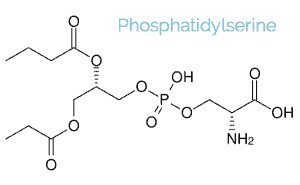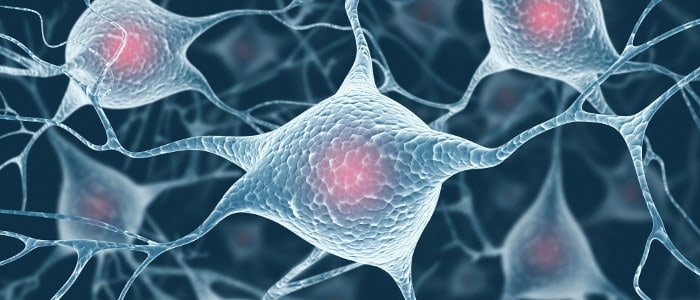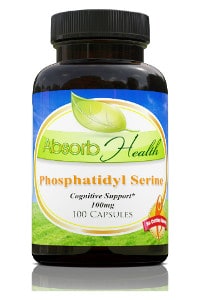Phosphatidylserine
Table of Contents
My Thoughts
Before venturing into nootropics years ago, I have never heard of phosphatidylserine. These days, I supplement with it on a regular basis, but completely separate from any nootropics I may be taking. I chalk it up as maintenance for my brain and body.
I particularly stay on top of using phosphatidylserine whenever I don't eat as healthy as I should, which is sadly more often than not (sometimes we have to pick our battles). Food is the body's main source of phosphatidylserine, and supplementing is how I make up for the shortfall.
What Is Phosphatidylserine
Phosphatidylserine (also called PS) is a phospholipid, an organic fatty acid compound that is structurally similar to a triacylglyceride. It is a vital component of all the cells in your body's tissues and organs, including the most complex organ of them all, the brain. More specifically, it's part of each cell's membrane and provides them with both structure and protection.

To maintain proper cellular function, your body needs phosphatidylserine. There is no way around it. Besides the brain, other body functions which benefit from PS include bone formation, heartbeat coordination, hormone secretion and cell repair.
Your body can make some phosphatidylserine on its own, but the primary source is from food [1]. The most phosphatidylserine-rich food available is the additive soy lecithin, at a whopping 5,900 mg of PS per 100 g. Beyond that, fish (especially Atlantic mackerel and herring), animal organs (hearts and livers) and white beans are your best bets.
Do note that there is a slight fatty acid composition difference in phosphatidylserine derived from plants compared to the one derived from animals. But, both are very beneficial.
If you can't get enough phosphatidylserine through food, supplements are your next best option. As much I would like to think I eat well, my nutrition often falls to the wayside, and supplementing is what I usually end up doing.
How Does It Work
Phosphatidylserine is a fatty acid compound and enters the central nervous system by crossing the blood-brain barrier. Once in, it helps the brain metabolize glucose, its primary source of energy. PS also promotes the release of and binds with several important neurotransmitters.
One of those neurotransmitters is acetylcholine, responsible for enhancing various cognitive processes like focus, memory, and reasoning. A shortage of acetylcholine can impede your learning ability, and even produce effects comparable to amnesia [2].
A 1993 study showed that phosphatidylserine increases the number of brain synapses [3]. Synapses are the equivalent of bridges or links between neurons. Neurons are a type of brain cell and are the building block of the nervous system. More synapses equal improved efficiency and quality of communication between neurons, which benefits all cognitive functions.

Because phosphatidylserine provides structure to cell membranes, it can also influence their fluidity [4]. This change makes it easier for your body to both move nutrients around and remove waste products. Improved cell membrane fluidity improves just about every cellular functions, including neural processing.
Benefits and Effects
As a core component of each of your cells, phosphatidylserine is beneficial to every single function of your body. Your cognitive abilities are, of course, no exception.
As a nootropic, phosphatidylserine can improve memory. But, it doesn't just stop there. It can also enhance everything from learning capacity and speed of memory recall to focus, concentration, and overall mental energy. In other words, phosphatidylserine improves cognitive functionality all around.
A recent American study shows just what the benefits can be of supplementing with 400 mg of phosphatidylserine a day. Measured improvements in the study subjects included better accuracy, with 39% fewer wrong answers and 13% more correct answers, and a 20% increase in the speed of calculations [5].
Taking phosphatidylserine can improve your mood and reduce the symptoms of depression. If you suffer from the latter, you usually have low levels of PS in your brain. Supplementing with it balances those levels out, but can also stimulate mood-controlling neurotransmitters, the presence of which improves your mood and further helps deal with related brain disorders. The two effects stack on top of each other, and the overall results can be quite significant. Taking 300 mg per day for 30 days can reduce the severity of depression by around 70 percent [6].

Phosphatidylserine also decreases cortisol levels, which can relieve stress. When you combine the supplement's abilities to promote memory, increase mental focus, improve your mood, and reduce stress, phosphatidylserine becomes a viable option for anyone diagnosed with ADHD. And there is proof of that too. A 2014 study published in the Journal of Human Nutrition and Dietetics concluded that "PS significantly improved ADHD symptoms and short-term auditory memory" [7].
Finally, phosphatidylserine can be a very effective neuroprotectant, slowing down age-related cognitive decline. When you get older, the membranes of your brain cells become more rigid. That is not a good thing for your cognitive abilities. PS provides structure to cell membranes and increases their fluidity, so supplementing with it can help reduce the effects of aging, and keep your mind sharp well into your later years.
All this said, if your only goal is to improve your already healthy memory, other brain enhancing supplements will give you greater bang for your buck. But, just as I do, nothing is stopping you from using those other more potent supplements while still regularly using phosphatidylserine to keep your mind and body healthy and strong in the long run.
Stacking
You can stack phosphatidylserine with just about any other nootropic. It is a safe and well-tolerated supplement. Popular choices include Noopept and pramiracetam. Because these two nootropics achieve their benefits in a very different way than phosphatidylserine, combining them can give some very nice synergistic effects.
Several stack in a box (as I like to call them) products include phosphatidylserine as part of their formula. For example, Onnit's Alpha Brain combines PS with L-Tyrosine and L-Theanine. It's a combination that has worked very well for me, making Alpha Brain one of few pre-formulated nootropic supplements with which I have seen good results.
With phosphatidylserine, there is also another path you can follow, one I have been on lately. You can use it purely as a supplement, regardless of whether or not you're taking any other nootropics. In other words, don't only take it when you want to hack your brain, but instead use it regularly with the longer term goal of maintaining the overall health of your body and mind.
Dosage
The typical recommended dosage of phosphatidylserine is 100 mg taken three times per day. But, because everyone's body reacts a little differently, only treat that as a general guideline and a good starting point. You may need to play around with the dosage a bit to get ideal results.
However, try to keep the amount you take to less than 500 mg per day. Beyond that, you increase the chance of running into phosphatidylserine's side effects, as rare and minor as they are.

If you take phosphatidylserine as part of a stack, you may want to go lower than 100 mg, especially if PS synergizes well with the other stack components. Onnit's Alpha Brain, for example, only includes 50 mg of phosphatidylserine in each pill. The reduced amount is due to how well PS works with L-Tyrosine and L-Theanine, the two other main ingredients of that product.
Side Effects
Being critical to the functioning of our brains and bodies, it's little surprise there have been countless studies into phosphatidylserine. Over the years, it has gone through a battery of toxicology and clinical research. It has also been tested on human subjects, with some studies lasting upwards of six months. At the end of it all, PS came out unscathed with a top notch safety record.
As long as you're taking phosphatidylserine in appropriate dosages, it is considered very safe. You can take it with any other nootropics and most medication. I regularly use it to supplement, regardless of which other brain enhancers I may be taking, and have never had issues.
If you choose to push the dosage boundaries, you may sometimes run into mild cases of insomnia or an upset stomach. But, these side effects are rare, and next to non-existent if you keep the dose reasonable. And really, there is no reason to take much more than the recommended amount anyway.
The one case in which you should stay clear of phosphatidylserine is if you're currently taking any medications for Alzheimer's disease, specifically acetylcholinesterase inhibitors. Taking the two together may increase both the effects and side effects of the Alzheimer's meds.
Where to Buy
 Most phosphatidylserine supplements are derived from soy lecithin. From time to time, you may also find a few that use sunflower seeds or cabbage as a source. All three of these will do just fine. 100 mg capsules are the standard.
Most phosphatidylserine supplements are derived from soy lecithin. From time to time, you may also find a few that use sunflower seeds or cabbage as a source. All three of these will do just fine. 100 mg capsules are the standard.
You should be able to find phosphatidylserine at your local health food store, and can always buy it online. As with most of my nootropics and other supplements, I choose to buy phosphatidylserine from Absorb Health. Wherever you end up getting yours, make sure to go with a reputable brand. The cheaper knockoff versions don't work nearly as well as the good stuff.
References
- http://onlinelibrary.wiley.com/doi/10.2903/j.efsa.2010.1749/abstract
- https://www.ncbi.nlm.nih.gov/pubmed/12050084
- https://www.ncbi.nlm.nih.gov/pubmed/8100181
- http://www.sciencedirect.com/science/article/pii/0005273675901212
- https://www.ncbi.nlm.nih.gov/pubmed/22017963
- https://www.ncbi.nlm.nih.gov/pubmed/1693032
- https://www.ncbi.nlm.nih.gov/pubmed/23495677

Leave a Reply